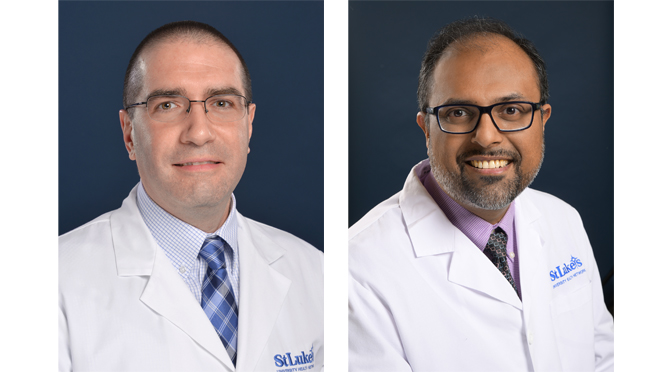|
|
Pictured from Left to right, Gregory Dobash, M.D. and Gibson George, M.D.
Treating patients for addiction is not for the faint of heart. But it’s imperative, particularly in rural regions of the country where the opioid epidemic kills thousands of people every year. That’s why St. Luke’s University Health Network created two fellowship programs—Addiction Medicine and Addiction Psychiatry—which are designed to certify physicians and psychiatrists in these growing fields.
Led by Gregory Dobash, M.D., the year-long Addiction Medicine Fellowship launched with two fellows in July 2024. And now the Network is also recruiting fellows for the Addiction Psychiatry Fellowship, led by Gibson George, M.D., which will start in July 2025.
“Our overarching mission is to train the workforce of addiction specialists who can provide care in the Lehigh Valley and in rural locations,” Dobash said. “Unfortunately, some people will fall through the cracks. They go to the ER for treatment for an overdose. They’re treated, revived, but there’s no warm handoff for that individual…Our goal is to have someone available to pick that patient up from the ER and continue their therapy and treatment.”
Dobash specializes in treating patients who are experiencing homelessness, suffering from mental illness and the disease of addiction, and those who are “economically challenged” or “chronically sick.”
“We need a workforce who understands addiction,” he said. “Detox is easy. Recovery is hard.”
When it comes to treating addiction, Dobash and George, a psychiatrist, understand medicine and psychiatry are often inextricably linked, so having specialists in both fields can better serve the affected population.
“We need both,” Dobash said. “I’d be hard pressed to think of a patient who did not have a psychiatric comorbidity that’s linked to addiction.”
George pointed out that St. Luke’s University Health Network is uniquely positioned to serve these patients thanks, in part, to the Network acquiring Penn Foundation in 2021.
“We now have the expertise in the [mental health and addiction] field and a backing of a huge health network,” George said.
Dobash and George are looking for physicians who understand the pathology and stigma of addiction.
“The big issue we face is being able to be compassionate in the face of people who can be rude and manipulative. We need to understand that that’s the pathology; it’s not that person’s choice,” George said.
Dobash said that this field of work, while challenging, can also be “extremely fulfilling…We can help people change and recover from years of abuse and misuse and become productive members of society.”
The ideal applicant, Dobash said, is someone who is willing to meet people where they are. “It’s very difficult to treat folks otherwise,” he said. “If you’re not willing to get down to where they are, if you’re waiting for them to get up to a certain level, you’re not going to have a lot of success.”
The Addiction Medicine Fellowship is available to individuals who have completed an ACGME-accredited residency in pediatrics, emergency medicine, internal medicine, family medicine, obstetrics/gynecology, preventative medicine, anesthesiology or psychiatry.
The Addiction Psychiatry Fellowship is available to individuals who have completed a residency in psychiatry.
About St. Luke’s
Founded in 1872, St. Luke’s University Health Network (SLUHN) is a fully integrated, regional, non-profit network of more than 20,000 employees providing services at 15 campuses and 350+ outpatient sites. With annual net revenue of $3.4 billion, the Network’s service area includes 11 counties in two states: Lehigh, Northampton, Berks, Bucks, Carbon, Montgomery, Monroe, Schuylkill and Luzerne counties in Pennsylvania and Warren and Hunterdon counties in New Jersey. St. Luke’s hospitals operate the largest network of trauma centers in Pennsylvania, with the Bethlehem Campus being home to St. Luke’s Children’s Hospital.
Dedicated to advancing medical education, St. Luke’s is the preeminent teaching hospital in central-eastern Pennsylvania. In partnership with Temple University, the Network established the Lehigh Valley’s first and only four-year medical school campus. It also operates the nation’s oldest School of Nursing, established in 1884, and 52 fully accredited graduate medical educational programs with more than 500 residents and fellows. In 2022, St. Luke’s, a member of the Children’s Hospital Association, opened the Lehigh Valley’s first and only free-standing facility dedicated entirely to kids.
SLUHN is the only Lehigh Valley-based health care system to earn Medicare’s five-star ratings (the highest) for quality, efficiency and patient satisfaction. It is both a Leapfrog Group and Healthgrades Top Hospital and a Newsweek World’s Best Hospital. The Network’s flagship University Hospital has earned the 100 Top Major Teaching Hospital designation from Fortune/PINC AI 10 years in a row, including in 2023 when it was identified as THE #4 TEACHING HOSPITAL IN THE COUNTRY. In 2021, St. Luke’s was identified as one of the 15 Top Health Systems nationally. Utilizing the Epic electronic medical record (EMR) system for both inpatient and outpatient services, the Network is a multi-year recipient of the Most Wired award recognizing the breadth of the SLUHN’s information technology applications such as telehealth, online scheduling and online pricing information. The Network is also recognized as one of the state’s lowest-cost providers.
Information provided to TVL by:
Sam Kennedy





